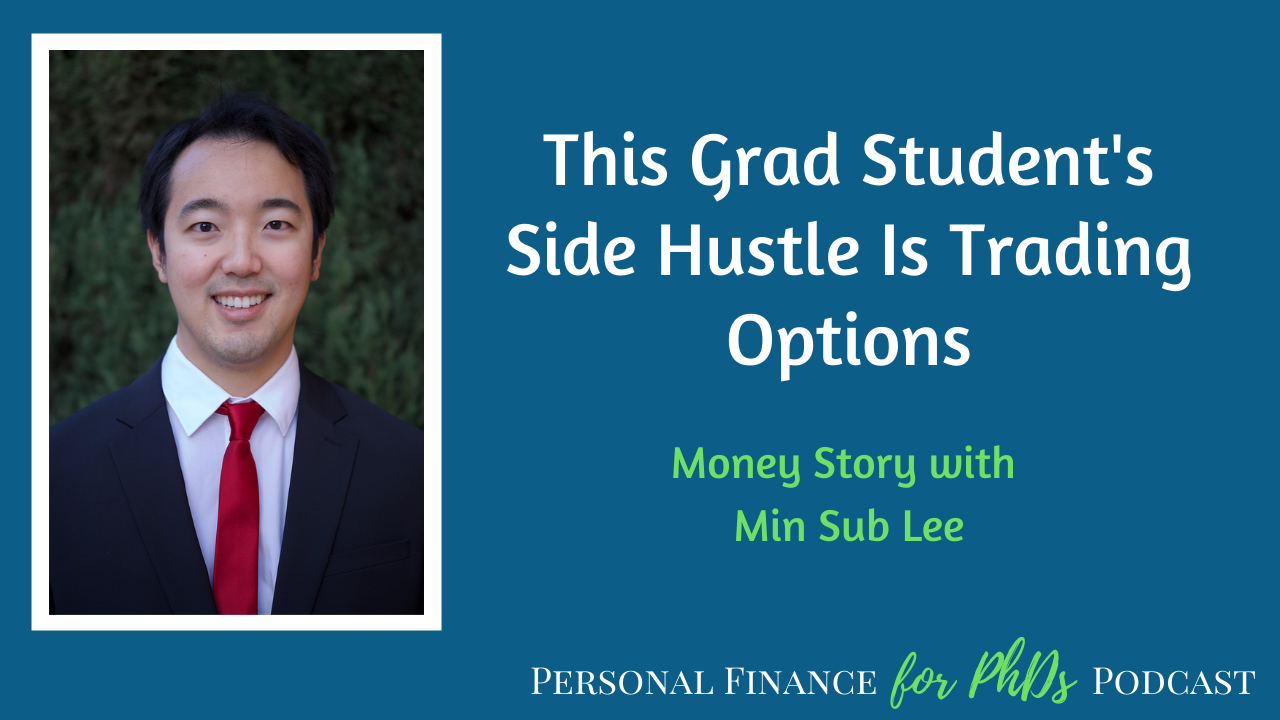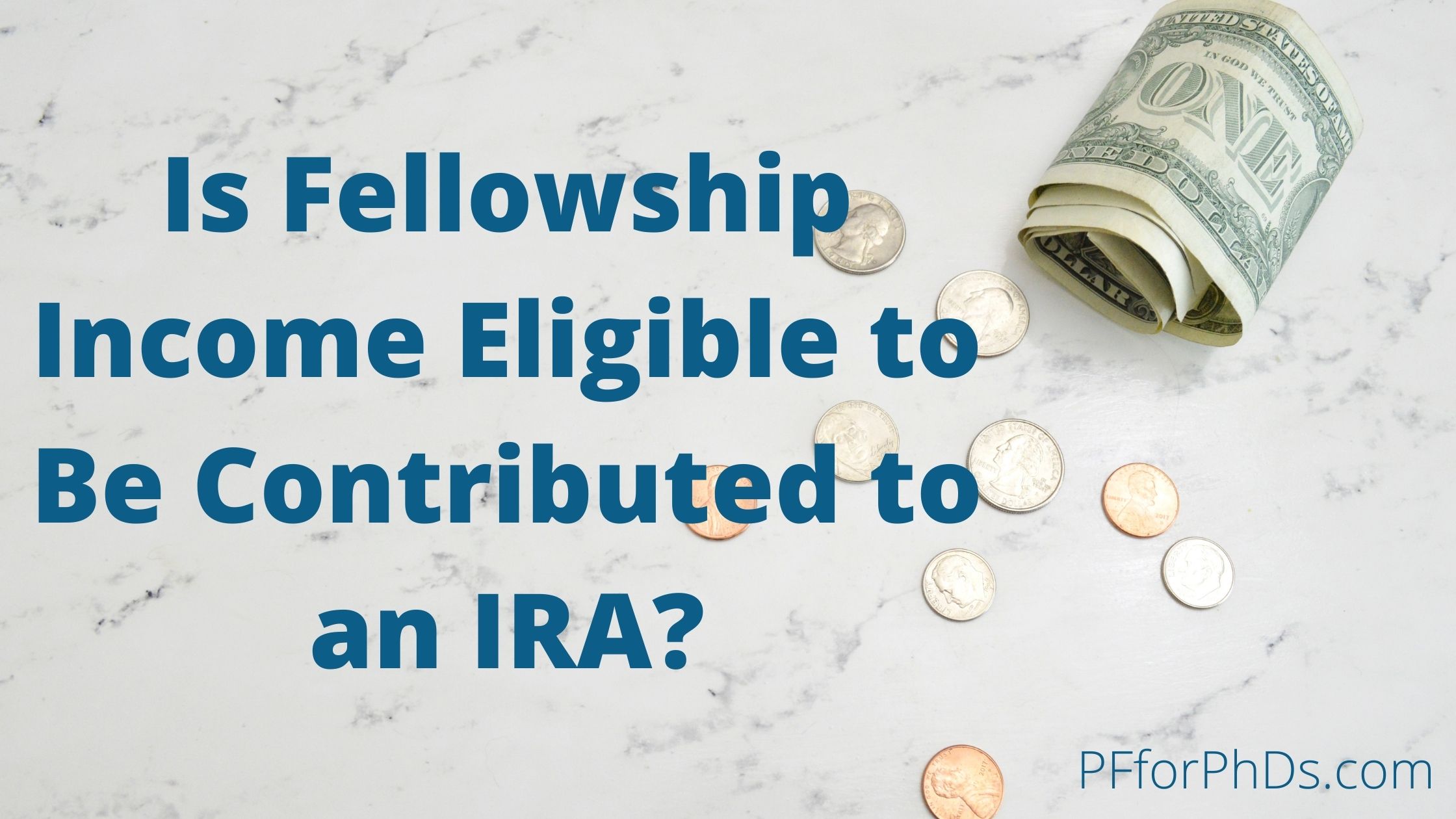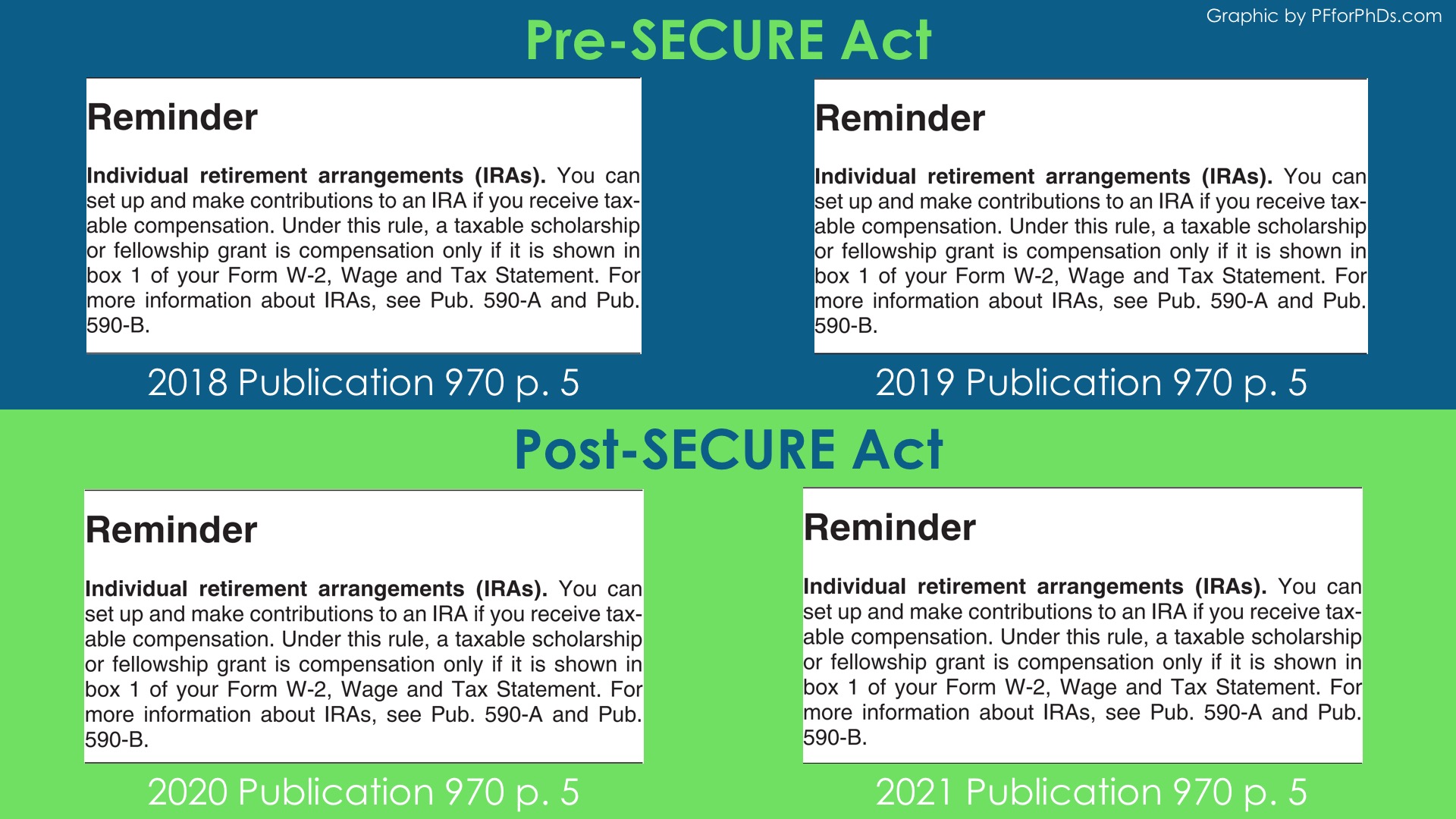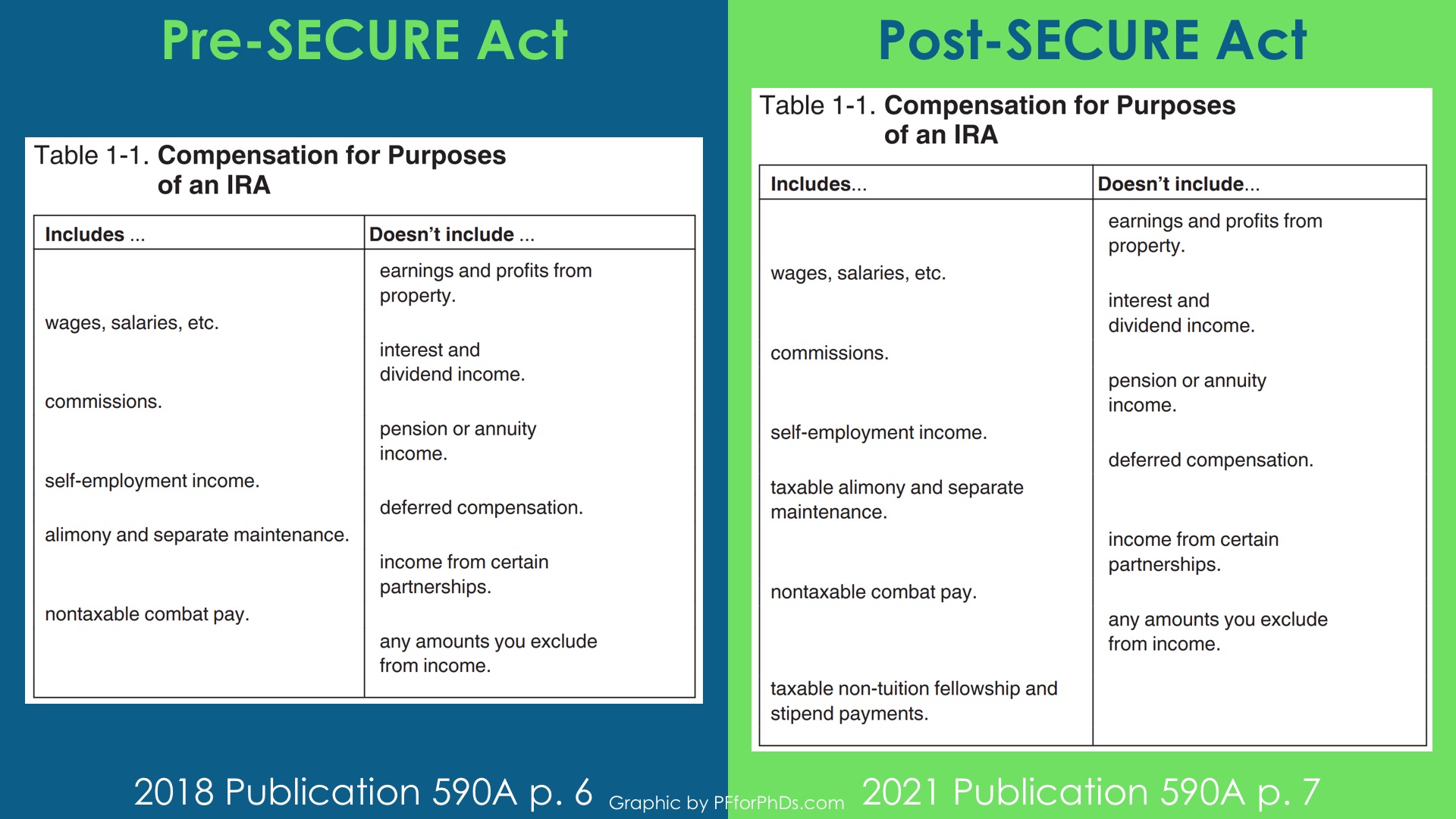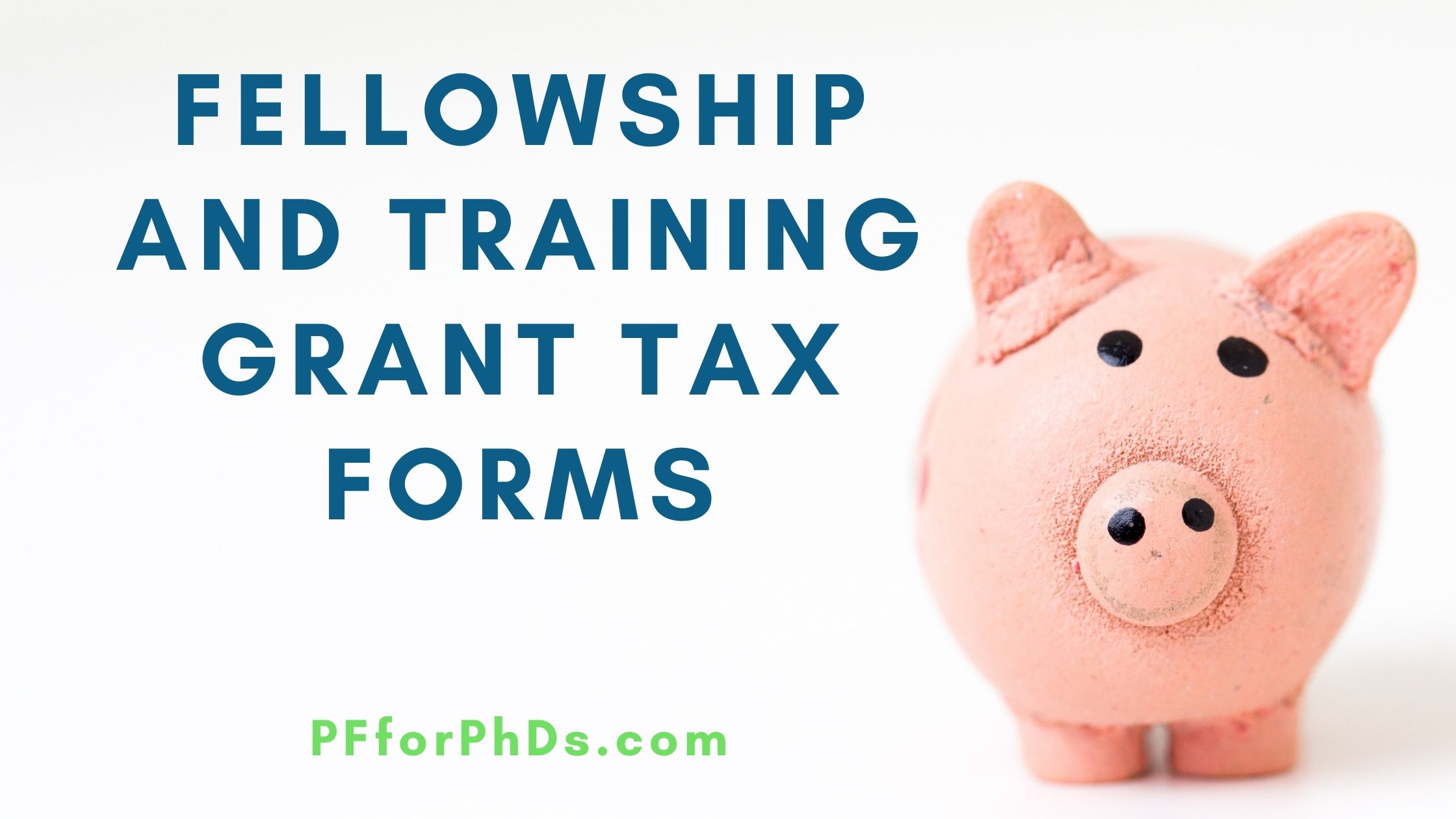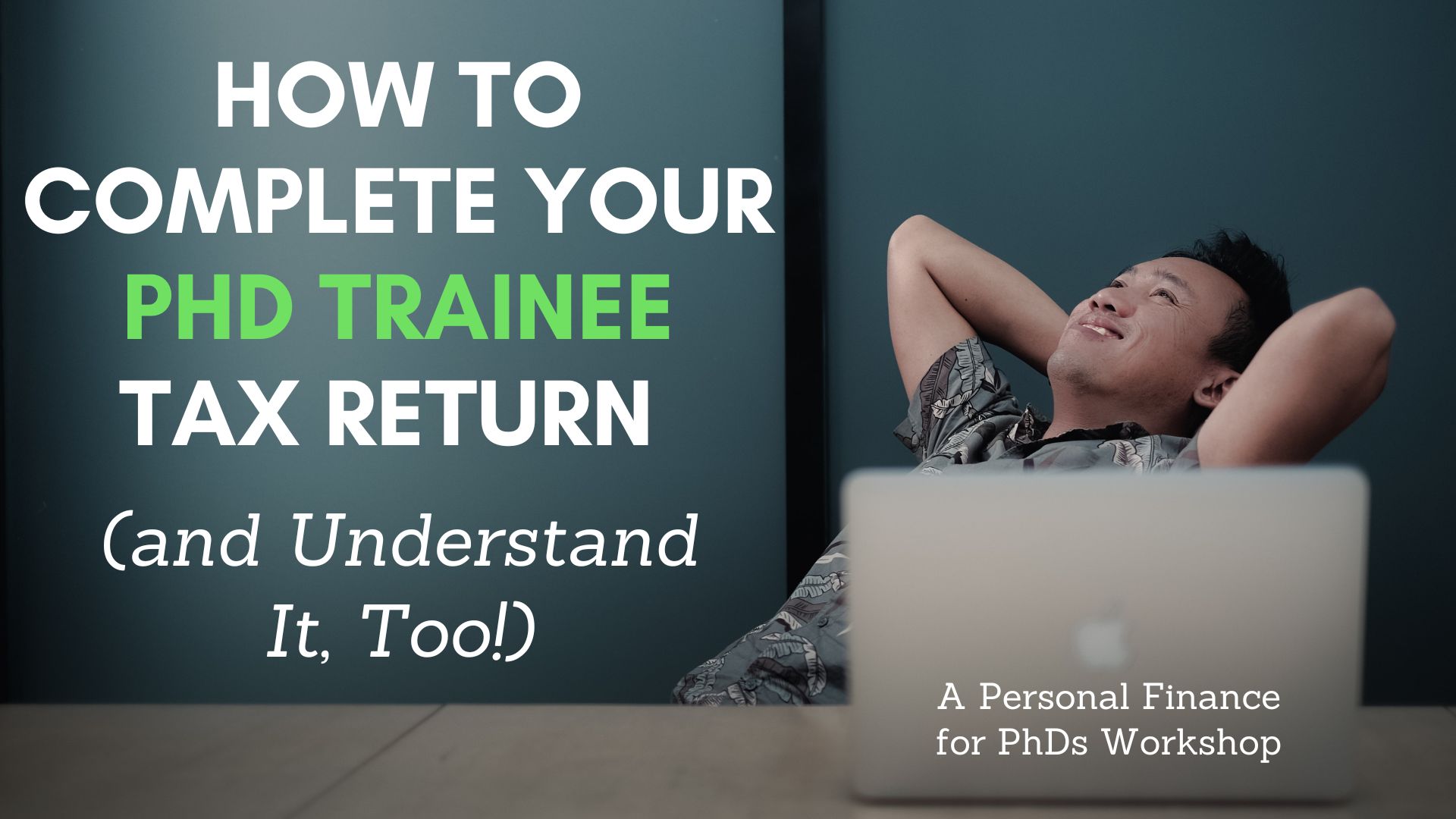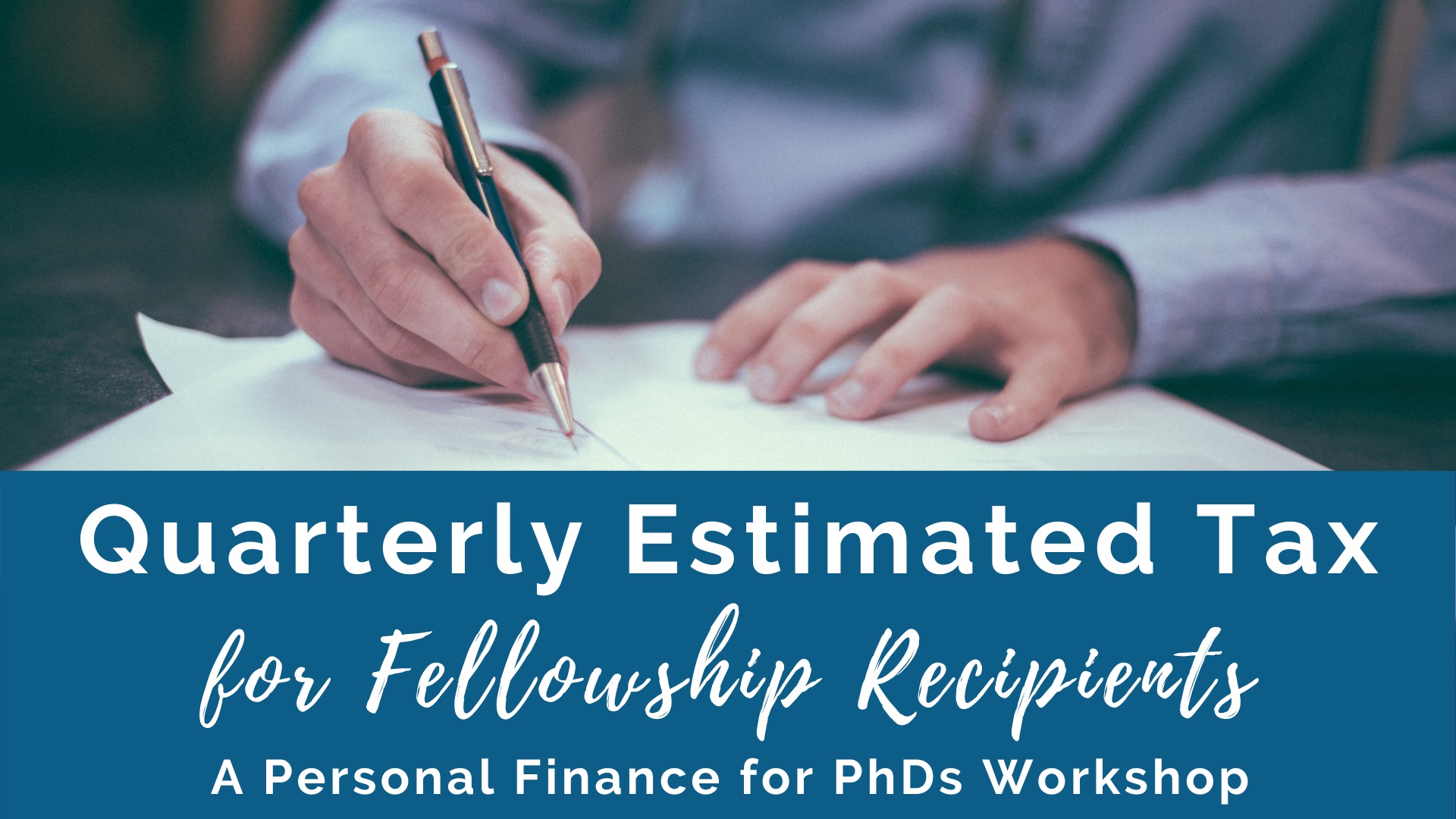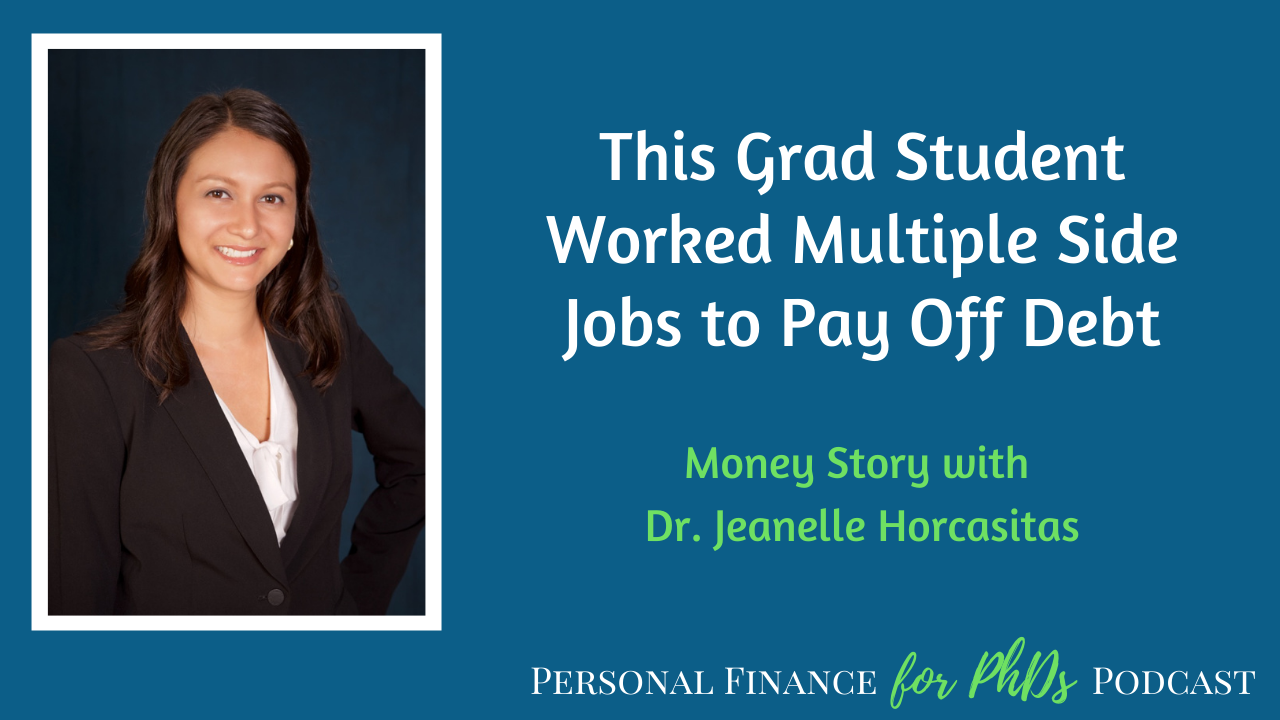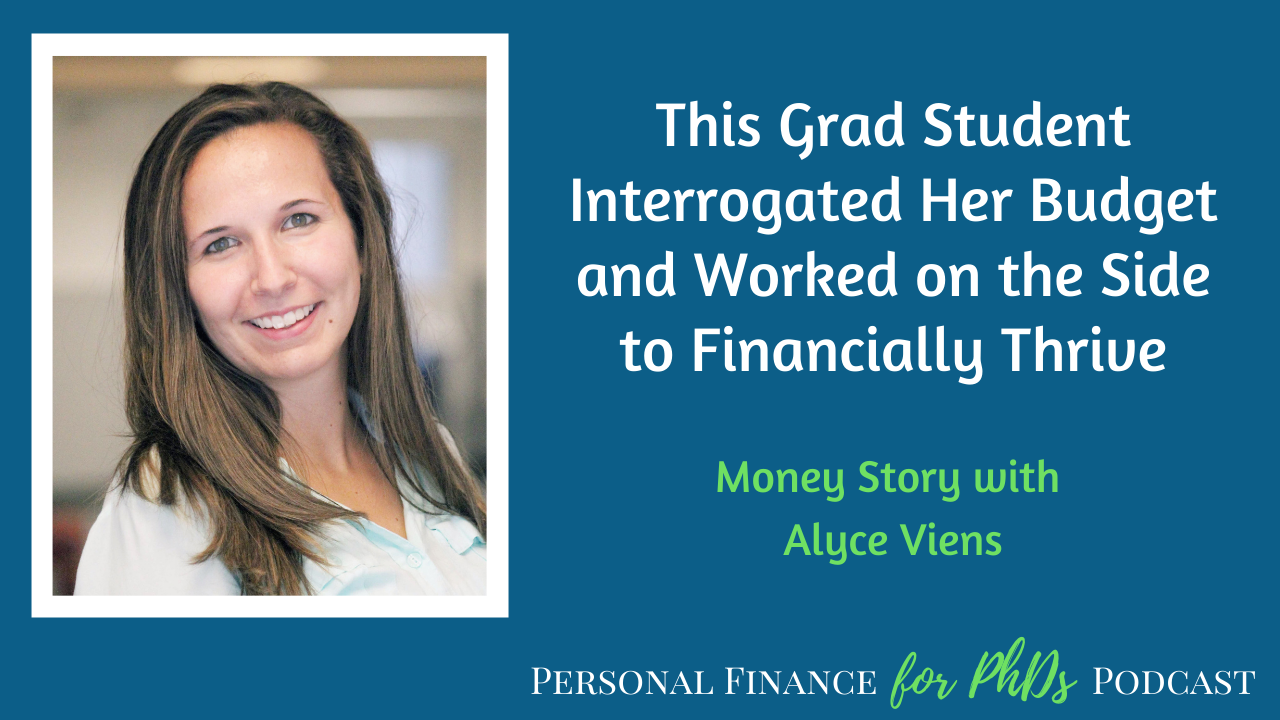In this episode, Emily shared the financial advice for prospective and rising graduate students that she collected from current graduate students and PhDs. This financial advice can be applied all the way from when you are reading a grad school offer letter to when you’re matriculating into your PhD program. The topics covered include evaluating cost of living, side hustling prior to or during grad school, saving up cash, purchasing a home, and investing.
Links Mentioned in this Episode
- PF for PhDs S5E2: Healthy, Wealthy, and Wise: Choose a PhD Program That Will Support Your Personal and Professional Development (Expert Interviews with Various Contributors)
- PF for PhDs: March Webinar for Prospective Grad Students
- PF for PhDs: April Webinar for Rising Grad Students
- PF for PhDs S7E14: How to Set Yourself Up for a Successful Career and Financial Life Post-PhD (Expert Interview with Dr. Jen Polk from From PhD to Life)
- PF for PhDs S6E6: How Work Experience Outside Academia Can Bolster Your Academic and Non-Academic Career (Money Story with Dr. Gillian Hayes)
- MIT Living Wage Database
- PF for PhDs: Free Tax Resources
- PF for PhDs S7E15: How to Solve the Problem of Irregular Expenses (Expert Discourse with Dr. Emily Roberts)
- PF for PhDs Quarterly Estimated Tax Workshop
- PF for PhDs S5E17: How to Qualify for a Mortgage as a Graduate Student or PhD, Even with Non-W-2 Fellowship Income (Expert Interview with Sam Hogan)
- PF for PhDs S8E4: Turn Your Largest Liability into Your Largest Asset with House Hacking (Expert Interview with Sam Hogan)
- PF for PhDs Youtube Channel
- PF for PhDs Live Q&A for First-Time Homebuyers
- PF for PhDs S7E7: A Lucrative Summer Internship Enabled This PhD Student to Max Out Her IRA (Money Story with Anonymous)
- PF for PhDs S2E1: As a Single Parent, This Graduate Student Utilizes Every Possible Resource (Money Story with Lauri Lutes)
- The Simple Path to Wealth (Book by J. L. Collins)
- PF for PhDs Subscribe to Mailing List
- PF for PhDs Show Notes and Transcripts
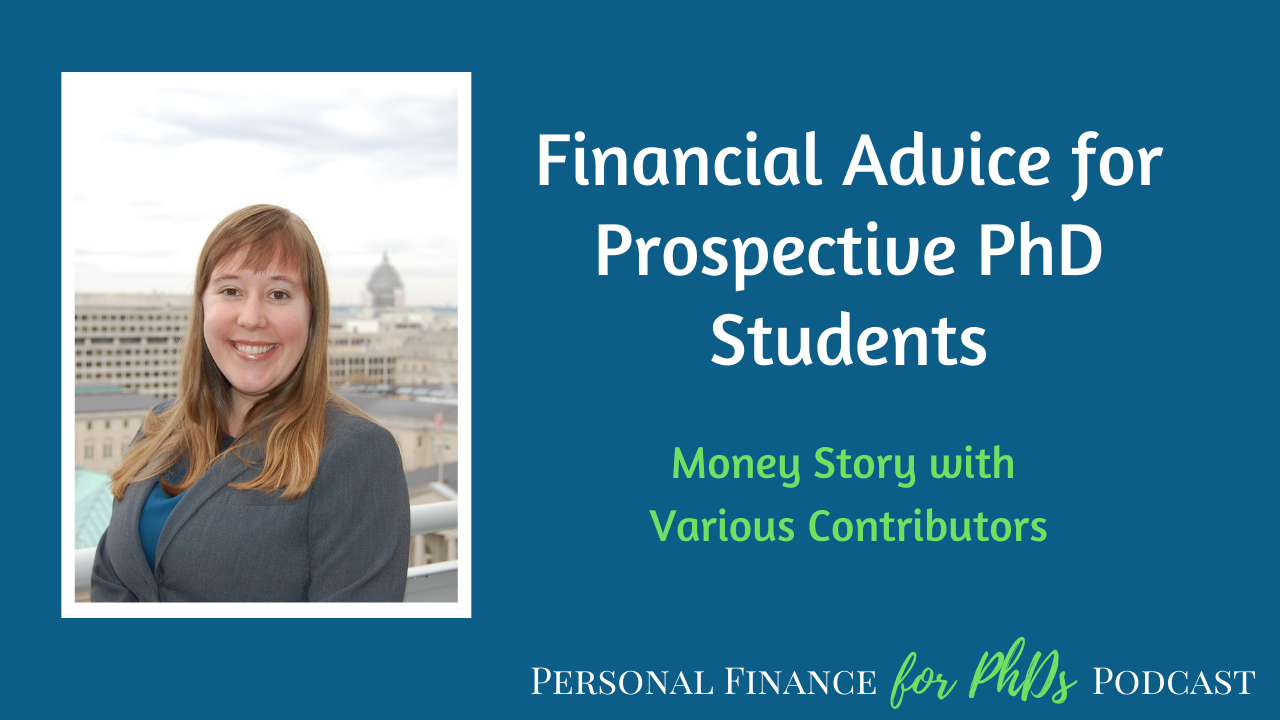
Teaser
00:00 Courtney: I really highly recommend using Emily’s savings bucket strategy throughout grad school to cover irregular expenses. About halfway through grad school, I started using the savings bucket strategy, which helped me feel a lot less stressed about money and my finances because when large expenses came up, I had a plan in place.
Introduction
00:25 Emily: Welcome to the Personal Finance for PhDs Podcast: A Higher Education in Personal Finance. I’m your host, Dr. Emily Roberts. This is Season 11, Episode 5, and today I’m sharing with you the financial advice for prospective and rising graduate students that I have collected from current graduate students and PhDs. This financial advice can be applied all the way from when you are reading a grad school offer letter to when you’re matriculating into your PhD program. The topics covered include evaluating cost of living, side hustling prior to or during grad school, saving up cash, purchasing a home, and investing. This episode is kind of a sequel to Season 5 Episode 2, Healthy, Wealthy, and Wise: Choose a PhD Program That Will Support Your Personal and Professional Development. That episode was also designed for prospective graduate students and included advice from invited contributors on finances, grad student unions, professional development, mental health, and work-life balance.
01:28 Emily: If you’re already in or beyond grad school, would you please share this episode and/or the previous one so that it can reach its target audience? I’m sure once you listen through it, you will agree with me that the advice is invaluable. If you planning to start a PhD program in 2022 and would like to learn even more about the financial side of this process, I invite you to attend a couple of upcoming free webinars, part of my series Set Yourself Up for Financial Success in Graduate School. The March webinar is for prospective graduate students, and you can find more information at PFforPhDs.com/prospective/. The April webinar is for rising graduate students, and you can find more information at PFforPhDs.com/rising/. If you’re not sure what I mean by prospective vs. rising, listen through the remainder of this episode. I hope that you will join me for these webinars. I will show you how to start graduate school on the right financial foot.
Do You Even Need to Go to Grad School?
02:33 Emily: The advice in this section is for prospective PhD students, by which I mean people who have already applied to programs and perhaps received some acceptances and/or started interviewing, but who have not yet committed to a program. We’ll start with the advice collected from your fellow graduate students and PhDs.
02:53 Emily: Our first topic is do you even need to go to grad school? And this is the advice from Elyse K: “Figure out if a PhD is absolutely necessary to do what you want to do, and only go if it is absolutely necessary. It is worth delaying school to be absolutely sure–don’t get a PhD to figure out what you want to do! This is financial advice because there is a substantial opportunity cost to going to school full time for 4-6 years–even if you have a full stipend and tuition waiver you would probably make more working full time. If a PhD it isn’t going to serve you after you graduate, you’ll be financially better off without it.”
03:37 Emily: This advice from Elyse K is spot on, and it is something that you must listen to as a prospective PhD student, even if it’s unpleasant, because you’ve already committed a lot to this process of getting into a PhD program, I’m sure. Not just the application cycle, but the years leading up to that. But don’t be trapped by the sunk cost fallacy. It’s only going to get worse and worse if you enroll in graduate school and it’s not the right path for you. So as Elyse says, and I agree, be absolutely sure that the PhD is the right thing for your career, the right thing for your personal life and that this is the right time for it. Much better to bail now than halfway through a program or even all the way through your program if you realize that it wasn’t the right choice for you. If you want to hear more discussion of the financial opportunity cost of getting a PhD, please listen to my interview with Dr. Jen Polk from season seven, episode 14.
Reading Your Offer Letter
04:37 Emily: Our next topic is on reading your offer letter, your funding offer letter, from a graduate program, and Elyse K again says: “Don’t go into debt for a PhD. Find a program that will pay you or save up and cash flow school.” Again, I totally agree with Elyse. I am very hard pressed to think of a field in which you would get a PhD, but not be paid to it. Very difficult to come up with that. So of course, almost certainly you’re going to be receiving offers of funding along with your offers of admission. But to put a little bit more nuance on Elyse’s point, just because someone is offering you full funding, doesn’t mean you wouldn’t incur debt by going into that PhD program, because the offer of funding might not be high enough or consistent enough to keep you out of student loan debt, or alternatively having to side hustle. So I want you to really keep your eyes wide open when it comes to evaluating whether this program will actually keep you out of debt. Next up, we have a clip submitted from Shana.
05:42 Shana: Hello, Personal Finance for PhDs community. My name is Shana Slebioda, and I’m a staff member at a research university who works with graduate students. My advice for rising PhD students is to ask about summer financial support. Summer support packages may be different from during the academic year, especially if your support comes mainly from being a teaching assistant, also known as a TA. If your funding letter does not contain specifics about the summer months, be sure to ask. Talk to a faculty or staff member in your prospective program to get additional information. You can also talk to current students in the program to find out how they spend their summers. Do this early. Your first summer session will be there before you know it. And good luck.
06:36 Emily: This is absolutely vital advice from Shana. And again, I completely agree. Your offer letter, ideally, should tell you how you’ll be funded for the entire first 12 months of your program. So, if it doesn’t include details about your summer, as Shana said, you need to inquire about it. Both from, you know, the DGS [Director of Graduate Studies] or whoever’s offering you the funding package, and also with current graduate students to find out how funding typically works in the summer, or if it’s funded at all. But I want to extend this advice to say that it’s also very important to get an idea of your entire funding path through the PhD. Not just through the first summer, but your second year, your third year, fourth year, and all of the summers as well. Your program might or may not be able to give you super specifics about your situation. Maybe they can, maybe they can’t, but that’s where current graduate students come in very handy because they will tell you what from their experience and what they’ve observed among their peers about how people are funded or not throughout their time in the PhD program.
Evaluating Cost of Living
07:37 Emily: Our next topic is on evaluating cost of living for, I would say all of the programs that you are seriously considering attending. Julia’s advice is: “Ask current students about living expenses and estimate your budget. In some cities, to rent an apartment you might need to pay three to four months worth of rent upfront (first and last month of rent, broker fees, security deposit). You might need to consider having a roommate.” Again, the advice to talk to current graduate students is the best. They are going to be the people best positioned to give you the picture of how finances are working on the ground in this PhD program.
08:14 Emily: And I love the specificity of how much you might be asked to put up to rent an apartment. This is very, very city-dependent. I’m guessing Julia may live in Boston or New York. Certainly there may be other cities that operate the same way, but yes, it can be very expensive to get into your first apartment. In some cases, up to four months of expenses, in some cases less, it’s just going to be really city dependent. So it’s something you need to investigate possibly before you commit to a program, but definitely at the point that you do commit to a program.
08:44 Emily: We also have some advice from Ben: “You can pretty much have a successful research career anywhere you end up. So don’t let thoughts about potential research advisors overshadow comparisons of cost of living and stipend when considering programs.” I wish that I had heard this advice from Ben when I was in this phase of being a prospective PhD student, because I absolutely number one was picking my program based off of the potential research that I could do there. The advisor that I would have, the resources that the program had at its disposal, these kinds of things. So I was really not giving any thought to finances or other personal considerations that I now know are very, very important to have you know, in the mix in your decision-making.
09:29 Emily: And so I now definitely agree with Ben that yes, the research considerations are very important, but so is understanding what your lifestyle is going to be financially during your time in graduate school. And so are a lot of other things you might call personal factors. So they all should have a place. And don’t forget that your finances and these other personal factors will affect how successful you are in your program. So these are not, you know, disconnected from one another. If you are super stressed about money, or if you have to go into debt or side hustle, it’s going to affect how well you perform in your research career and potentially how long it takes you to graduate. So, as I said, all the factors should go into the mix.
Working Before or During Grad School
10:13 Emily: Our next topic is on working, either in this period of time between now and when you matriculate or after you matriculate. Our first piece of advice is from Gillian Hayes: “Work as much as you can in paid positions before returning to graduate school to save money to bridge the difficult times during the PhD. You may also make connections that will allow you to do side hustles or internships during your program.” Coming into graduate school with cash savings sets you up as best as possible to have a strong financial position. When I think about people who start graduate school without cash savings, or maybe even with, you know, incurring some credit card debt because of those moving expenses, you’re sort of thrown onto your back foot financially, like you’re off balance.
11:03 Emily: It’s not a strong position to start in. And of course it’s necessary in many cases, but I like Gillian’s advice. I agree with it. If at all possible, work before getting into that PhD program to generate cash savings so that you have money for moving, so that you have money for start up expenses. And so that you don’t have financial stress at the same time you’re trying to get started in your program. I also totally agree with her that working certain kinds of jobs will help you in your career that you’re trying to pursue during your PhD, and things like internships and side hustles can be part of that. If you’d like to hear more from Gillian, and I know you would, you can listen to her full interview in season six, episode six.
11:45 Emily: And here’s some advice from Nell: “Consider having another job. When I went to grad school, I went part-time with my previous full-time job. I’ve done it during school for 4 years now. I’ve noticed among my friends and colleagues that it’s the grad students who have second jobs who seem happier and mentally healthier, and have less trouble meeting their deadlines and keeping grad school anxiety in perspective. Obviously, you should keep monitoring yourself to see if it’s sustainable or the right choice for you. I have moments where I feel overwhelmed. But I have a lot less anxiety about grad school since it’s not my entire professional identity and I’m not taking a huge pay cut to be here. I see people who have never held another job applying for academic jobs and facing the possibility that they will not get anything permanent or well-compensated, even though they are excellent at what they do. They don’t know how to pivot and are doubting all their choices. It’s not their fault; it’s the market. But I see having a second job as a hedge against the kind of personal and financial crisis that comes in those circumstances.”
12:46 Emily: I think it’s really going to depend on your program and your field, whether holding a concurrent second part-time job is feasible, and also of course your personal responsibilities as well. So it seems to be working for Nell. And of course, she has great advice by saying keep monitoring yourself to see if it’s sustainable. So I don’t know if like a full like part-time job, like 20 hours a week or something is going to be right for everyone. But I do agree with her that it does lessen anxiety related to graduate school when it’s not, as she said, her whole professional identity or even identity generally. And so I do think it’s really healthy to have a side hustle or some kinds of side pursuits during your time in graduate school, because it does give you a break from all of your focus on your PhD.
13:33 Emily: It may give you another source of income, which can help with financial stability. So there are lots of positives to it. The drawbacks being of course, the time management aspects, the energy management aspects. So, you have to know yourself in this respect, but I do think it’s well worth considering. So if you have currently a full-time job that it’s possible to keep working for that employer part-time, either on still an employee basis or maybe a contractor basis, I think that’s worth having a conversation, it’s worth a tryout, of course, given that it would be allowed by your graduate program. Now, some graduate programs do bar outside work or outside work of a certain type or above a certain hourly commitment. So you have to be careful about that, but I do like the suggestion. And alternatively, if you’re not in a full-time job that you would, you know, consider taking with you in some capacity into graduate school, the next suggestion is to develop some kind of side hustle during these months between now and when you matriculate that you’ll be able to take with you into graduate school.
Emily’s Best Advice for Prospective PhD Students
14:28 Emily: My best advice for prospective PhD students is to 1) interrogate your offer letter, and 2) compare your actual salary to the local cost of living. What I mean by interrogate is that there’s a set of about a half-dozen financial questions that you need to have answers to regarding your funding package to fully understand what your finances will look like during your PhD program. One example is how much of what is listed as your stipend in your offer letter will you pay in tuition, fees, and/or your health insurance premium. You need to subtract those mandatory fees from your stipend to see what you’ll actually be paid before taxes. If your offer letter doesn’t provide all the answers, you’ll need to ask the questions of the program’s administrative staff.
15:12 Emily: However, the absolute stipend numbers are not the whole picture. Obviously, $30,000 is going to go a lot further in West Lafayette, Indiana than Seattle, Washington. You need a way to normalize the stipend to the local cost of living. The first-pass way that I suggest you do this is to use the numbers in the Living Wage Database from MIT at livingwage.mit.edu. You can divide each stipend by the local living wage to get an idea of how much purchasing power the stipend will actually provide.
15:48 Emily: I suggest making a spreadsheet to keep track of all these factors, and in fact I will provide such a spreadsheet in my upcoming Set Yourself Up for Financial Success in Graduate School webinar for prospective graduate students. In this webinar, I’ll expand on what I stated above and cover additional timely topics, including one that is almost taboo in academia. The webinar is free and you can find more information and how to sign up at PFforPhDs.com/prospective/.
Commercial
16:19 Emily: Emily here for a brief interlude! Taxes are weirdly, unexpectedly difficult for funded grad students and fellowship recipients at any level of PhD training. Your university might send you strange tax forms or no tax forms at all. They might not withhold income tax from your paychecks, even though you owe it. It’s a mess. I’ve created a ton of free resources to assist you with understanding and preparing your 2021 tax return, which are available at PFforPhDs.com/tax/. I hope you will check them out to ease much of the stress of tax season. If you want to go deeper with the material or have a question for me, please join one of my tax workshops, which are linked from PFforPhDs.com/tax/. I offer one workshop on preparing your annual tax return for graduate students and one workshop on calculating your quarterly estimated tax for fellowship and training grant recipients. It would be my pleasure to help you save you time and potentially money this tax season, so don’t hesitate to reach out. Now back to our interview.
Cash Savings for Rising PhD Students
17:35 Emily: The advice in this section is for rising PhD students, by which I mean, people who have committed to attending a particular PhD program, but have not yet matriculated. We’ll start with the advice collected from your fellow graduate students and PhDs. Our first topic is the necessity of cash savings. Our first piece of advice is from Elyse K: “Adjust your budget now to your stipend income and save up to make sure you have a substantial emergency fund (more on the 6 months of expenses side than 3 months). Many universities only offer students crappy or expensive healthcare plans. Hopefully, you are healthy over the next four-to-six years, but knowing you can cover a high insurance out-of-pocket maximum without additional debt is comforting.” This is definitely great advice, especially if you’re currently working and living on a salary that’s higher after adjusting for cost of living than the stipend that you will be on in just a few months. So, it’s great advice. Live on that future stipend and save everything you can in between now and then. I also love that she points out the importance of having an emergency fund and yeah, knowing your insurance benefits. So knowing what your deductible is, what your co-insurance responsibilities are. You can find out this information now to start preparing. Next, we have a clip from Courtney.
18:57 Courtney: Hi, my name is Courtney, and last year I graduated with my PhD in microbiology. My biggest piece of financial advice for grad school is to set up an automatic transfer after you get your stipend payment to a separate savings account for paying taxes if you do not get income taxes withheld from your paycheck, which I know many graduate fellowships do not. This way, the money is already allocated when it comes time to pay quarterly estimated taxes, or when you file taxes in the spring. And jumping off of that, I really highly recommend using Emily’s savings bucket strategy throughout grad school to cover irregular expenses, such as large purchases, maybe medical deductible payments, or friends’ weddings. Also, it’s important to save for an emergency fund, maybe a pet fund if you have a pet, and planning for fun thing as well, such as vacations. About halfway through grad school, I started using this savings bucket strategy, which helped me feel a lot less stressed about money and my finances because when large expenses came up, I had a plan in place. I used this strategy to save for a month’s worth of living expenses to cover a month gap in between when I finished my PhD and when I started my new position, and I also was able to save up for a vacation to celebrate my graduation and really treat myself after completing my PhD.”
20:34 Emily: I love that Courtney gave us these specific examples of how targeted savings buckets can be used. For her, it was paying her taxes and also saving up to cover an income lapse and saving up for a vacation. I love that she said it made her less stressed. If you’d like to learn more about this savings bucket strategy, I devoted a whole podcast episode to it. It’s season seven, episode 15: How to Solve the Problem of Irregular Expenses. It goes beyond just having an emergency fund to preparing through saving for other large irregular expenses like taxes, like having to buy flights, like having to replace your computer or buy furniture or any other large purchases you might have to make. Specifically on the topic of taxes, it’s very important for you to know sometime before you matriculate that it’s pretty likely that at some during graduate school, you are going to be funded through a source of what I call awarded income. It might be called a fellowship or a training grant or a scholarship or some other kind of award that pays your stipend.
21:38 Emily: And if that is the case, most universities will not withhold income tax on your behalf the way they do for employees. You may be an employee at other points in your graduate career, like having an assistantship. But if you’re ever not an employee, then that income tax withholding may not be offered to you. And if that is the case, you will be responsible for making your own tax payments manually, whether that’s up to four times per year through the estimated tax system, or in one lump sum when you file your tax return each spring. So as Courtney said, it’s really important to save up for those tax bills. I like to call it, setting up a system of self-withholding. So you’re sort of simulating the withholding that would be done by an employer if you had one by doing, as she said, these auto-transfers. Every time you receive a paycheck, set up an automatic transfer to go into your designated tax savings account for an appropriate amount of money. If you’d like more detail about how to do these calculations around taxes or the system of self-withholding, I have a whole workshop devoted to it, which you can find at PFforPhDs.com/QETax, that’s for quarterly estimated tax. And this is something that I wish every matriculating graduate student was told during orientation that estimated tax is your responsibility, potentially, if you are on one of these non-W-2, non-employee sources of income.
23:03 Emily: And our final piece of advice regarding cash savings is from Julia: “Try to save even a little bit and put the money away for savings and/or retirement investments. Learning about investing can be overwhelming, but you can start with passive investing in a couple of general ETFs (e.g., tracking S&P 500 and international stocks for diversification) and learn more as you go. To avoid overwhelm, allocate fixed time slots to learn about finance, e.g., 1 hour per week. Eventually, you’ll become more comfortable.” I mean, of course, I totally agree with this advice from Julia. It’s kind of everything I do in my business teaching about personal finance, and I especially love talking about investing with graduate students and postdocs. It’s very easy to get started with passive investing. It’s very easy to manage investments passively. So it’s something that can be completely compatible with your journey as a graduate student, as long as your finances are ready for it. I would say it’s more important to build up some of the emergency and buckets we’ve been talking about and pay off high priority debt, like credit cards, before getting involved with investing. But once your finances are ready for it, it does not have to be a big time suck for you. So that’s great advice from Julia.
Homeownership
24:17 Emily: Our next topic is homeownership. This is one of my favorite new topics to be talking about with graduate students and early-career PhDs. Here’s the advice from Nell: “Seriously consider home ownership EARLY in your program. Emily and her brother have covered this on the podcast, but you ideally need 3 years of funding remaining. I bought a place at the beginning of my second year. The second job and the 5 years of continuance made it easier to get a mortgage. Meanwhile, I have a friend in his 5th year, now in the process of buying a place, and he found out about the 3-year continuance rule very late, causing an extremely stressful family situation and problems with his department, who he had to beg for a letter promising him more funding. While there have certainly been stresses with my place (roof, plumbing) which I am privileged to be able to deal with, the fact that I can go away for research and rent it out rather than have to pay two rents or put all my stuff in storage means that I am able to be much more mobile and flexible as I design how I will spend my time researching and writing the dissertation. Again, this is about peace of mind and mental health as much as financial security.”
25:23 Emily: This advice from Nell is so valuable. Now, I have to say, first off, many graduate students are not in a position to buy. The vast majority of graduate students are not in a position to buy a home, because several factors have to come together kind of perfectly. You have to live in a housing market where the home prices are not very, very high. You have to have a stipend that is high enough to manage to, you know, qualify for a mortgage in that market. And you have to have some savings place for the down payment and the closing costs, moving costs, these kinds of things. And you have to have good credit. So these things all have to come together. But for some graduate students, it is possible.
25:58 Emily: And if you think you may be in that situation, you should definitely investigate it early on. I have done several podcast episodes with my brother, Sam Hogan. He is a mortgage originator with Prime Lending (Note: Sam now works at Movement Mortgage) who specializes in graduate students and PhDs. And he knows all the ins and outs of qualifying for a mortgage, even when you have non-employee income fellowship income, which for some lenders is unfamiliar. The podcast interviews that I’ve done with Sam in the past are season five, episode 17, How to Qualify for a Mortgage as a Graduate Student or PhD, Even with Non-W-2 Fellowship Income, and season eight, episode four, Turn Your Largest Liability into Your Largest Asset with House Hacking. Those are really exciting episodes to listen to, but I do want to tell you there have been some updates, especially to the content that Nell just talked about. So, we used to think there was this necessity to have three years of guaranteed funding when you had a non-W2 type position as a graduate student or postdoc, but Sam has actually found a way kind of around that in some cases.
27:00 Emily: So, I would say it’s very helpful to have three years of continuance, but not strictly necessary for everyone. So the best thing to do is to talk to a mortgage lender like Sam, or like someone else who’s familiar with PhDs and graduate students, and get their perspective on your income type and your whole like picture to see whether or not you would be able to qualify for a mortgage. Check out the Personal Finance for PhDs’ YouTube channel for some of those like short updates. I’ve been publishing clips from the live Q&A calls that I’ve been hosting with Sam for first-time home buyers. If you’d like to learn more about that, go to PFforPhds.com/mortgage to find out when the next live Q&A call will be. By the way, if you want to reach out to Sam directly, the best way is probably to text or call his phone number, which is (540) 478-5803. Or you can email him at [email protected].
27:59 Emily: I really love Nell’s perspective in this advice of having it be an ease on her mind and her finances to own a home versus renting when she has to be away for research purposes. Like I never thought about that before. So I’m really glad to get Nell’s perspective on this. I’m really glad that it’s worked out for her. Elyse K also added this advice: “If you’ve been working full time and it is the right time for you, consider buying a home you can afford on your stipend before your full-time income is gone because it will be easier to get financing.” Again, you can hear a lot of concern about qualifying for a mortgage as a graduate student. It is an area of concern, but Sam can help you with this specifically if you want him to. But Elyce’s advice is really good. If you are going from a full-time job into graduate school, and especially if you’re not moving cities, getting that mortgage and the home purchase done before starting graduate school is a good idea. But as she said, make sure you can afford it on your stipend, not just your current salary.
Working During Your PhD
28:54 Emily: Our next topic is working while you’re pursuing your PhD. So, Gillian has this advice: “Intern. No matter what your field, there are internship opportunities. This will provide insight into non-academic career paths as well as extra money during your studies.” I could not agree with Gillian anymore about this. Internships are becoming much more widely available and acceptable to do during a PhD, which is wonderful. And they often pay more than the, you know, stipend that would be getting during that time anyway. Again, listen to that previous episode that I did with Gillian and also check out season seven, episode seven, where I interviewed a current PhD student who did a very well-paid summer internship with a tech company, and that worked out very nicely for her finances.
29:42 Emily: But really, Gillian’s point about gaining insight into non-academic career paths is the invaluable part of this. Like, yes, the money is nice, but while in graduate school, you are setting yourself up for your future career, and doing internships and other kinds of work opportunities do serve that goal just as much as your PhD studies do. And this advice is from Elyse K: “Consider finding or starting a side hustle within your university’s boundaries (many allow <20-hour per week part-time positions). Part-time income can make or break PhD students; I’ve seen some have to drop out because they need money.” Again, really solid advice. It should not be the case that graduate students need side hustles or need student loan debt to financially get them through graduate school. Yet this is the reality for a lot of people, or if not strictly necessary, sometimes side hustles can just enhance your lifestyle and make things a little bit better for you during graduate school. Whatever the reason, I think side hustling is a great idea, but of course you have to make sure that it’s not interfering with your progress towards your degree. That is primarily what you are in graduate school to do.
Financial Assistance as a Grad Student Parent
30:54 Emily: Next, I have some great comments from an anonymous contributor who is a graduate student parent. “Even if you think you do not qualify, consider applying for income assistance programs such as SNAP, Medicaid, and other DHS programs for needy families. Generally, students enrolled over half-time do not qualify for SNAP, but if you have any of these exemptions, there’s a chance you’ll qualify. Some exemptions include: Are under age 18 or are age 50 or older. Have a physical or mental disability. Work at least 20 hours a week in a paid, on-the-job training program. Work at least 20 hours a week in paid employment. Participate in a state or federally-financed work study program. Participate in an on-the-job training program. Care for a child under the age of 6. Care for a child age 6 to 11 and lack the necessary child care enabling you to attend school and work 20 hours a week or participate in work study. Are a single parent enrolled full-time in college and taking care of a child under 12.”
31:50 Emily: “With children you may also qualify for state funded childcare, children’s health insurance, and possibly even income supplementation. These are often wrapped into the same application at your state’s Department of Health and Human Services website, making it much simpler to apply for all at once. You never know until you apply, and you just might be surprised. Every dollar helps! Every so often you will need to reapply or get re-certified so you’ll be asked to update your information periodically, so always look for these very important mailings once you’re involved in any assistance programs or you could risk losing coverage for not responding in time.”
32:22 Emily: Super appreciative to anonymous for submitting these comments. This is not something I had personal experience with during graduate school, so I really appreciate, you know, the community member stepping up to speak to this situation. In season two, episode one, I published an episode with Lauri Reinhold [Lutes] who was a single parent during graduate school. And what came through in that interview was how intentional Lauri was in choosing her graduate program, choosing one that would be supportive of her needs as a graduate student parent, and then also applying for every single benefit she possibly could on behalf of herself and her daughter once in graduate school. So that’s another great interview to follow up with to learn more about this topic if you are a parent or are planning on becoming a parent.
Final Pieces of Advice
33:05 Emily: And for our last topic, we have a really quick piece of advice from Ben, which is: “Read The Simple Path to Wealth by J.L. Collins!” So this advice is on investing again and how relatively accessible it is. I read The Simple Path to Wealth myself about a year ago, really enjoyed it. J. L. Collins is a really easy person to read and understand all about index fund investing, passive investing. So, highly, highly recommend that book as well. And thank you, Ben, for that advice.
33:34 Emily: My best advice for prospective PhD students echoes some of what you just heard, and it’s to work between now and when you matriculate to save up cash for your move, startup expenses, emergency fund, et cetera. If you’re already working a well-paid full-time job or have existing cash savings, that’s awesome, and you’re on a great track. If you are currently a college student or have a not-so-well-paid job, like I did before grad school, it’s time to think about how you can increase your income over the coming months so you can save. Can you do a paid internship? Can you get a full-time temporary position with a good pay rate? Can you start a side hustle, ideally one that you can take with you to graduate school? I love flexible self-employment side hustles for graduate students, such as consulting, freelancing or teaching, but it can take time to build up a client base, so start laying that groundwork now, or at least over the summer.
34:31 Emily: We’ll expand on this topic in my next Set Yourself Up for Financial Success in Graduate School webinar for rising graduate students. We’ll also go deep on the financial decisions you’ll have to make this spring and summer that can literally make or break your finances during grad school. And I’ll give you some guidance on those. The webinar is free and you can find more information and how to sign up at PFforPhDs.com/rising. Thank you for listening through this episode, and a special thanks to those who contributed their best financial advice. Before you go, don’t forget to share this episode with a prospective PhD student, and if you want to join me for the upcoming webinars in my Set Yourself Up for Financial Success in Graduate School series, you can find more information at PFforPhDs.com/prospective/ and PFforPhDs.com/rising.
Outtro
35:28 Emily: Listeners, thank you for joining me for this episode! I have a gift for you! You know that final question I ask of all my guests regarding their best financial advice? I have collected short summaries of all the answers ever given on the podcast into a document that is updated with each new episode release. You can gain access to it by registering for my mailing list at PFforPhDs.com/advice/. Would you like to access transcripts or videos of each episode? I link the show notes for each episode from PFforPhDs.com/podcast/. If you’ve been enjoying the podcast, here are 3 ways you can help it grow: 1. Subscribe to the podcast and rate and review it on Apple Podcasts, Stitcher, or whatever platform you use. 2. Share an episode you found particularly valuable on social media, with an email list-serv, or as a link from your website. 3. Recommend me as a speaker to your university or association. My seminars cover the personal finance topics PhDs are most interested in, like investing, debt repayment, and increasing cash flow. I also license pre-recorded workshops on taxes. See you in the next episode, and remember: You don’t have to have a PhD to succeed with personal finance… but it helps! The music is “Stages of Awakening” by Podington Bear from the Free Music Archive and is shared under CC by NC. Podcast editing by Lourdes Bobbio and show notes creation by Meryem Ok.
